|
"St. Therese wrote at the end of her Manuscript B, 'If by chance God found a soul smaller than mine and still more simple, I really believe that He would fill it with graces still greater.' I believe that this soul is truly Van." --Pére Olivier de Roulhac, O.S.B., vice-postulator for Marcel Van's cause Marcel Van is the beloved little (spiritual) brother of St. Thérèse of Lisieux. When I have mentioned him to people, sometimes they say, “Oh, yes, one of St. Thérèse’s adopted missionary priest brothers to whom she wrote while in the convent.” No, I have to explain, that would be Maurice Belliere you’re thinking of. He was also a beloved little spiritual brother of St. Thérèse, but he was her contemporary and also French, whereas Marcel Van, like us, was born many years after she died, and in another country. And yet Marcel lived on quite intimate spiritual terms with Thérèse. That he lived in a different time and place than she did was no obstacle to God’s plan for their sibling affection, conversation, and friendship, and because of Thérèse’s love for him and his love for her, this “other” little brother of hers has much to teach us. 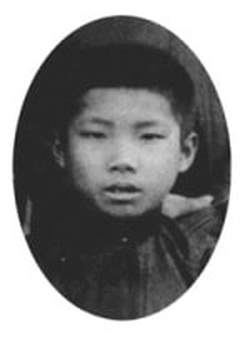 Joachim Van (later known as Marcel Van) was born in Vietnam in 1928, thirty years and six months after his big sister, St. Thérèse, died in France. He was born into a family that had already welcomed a boy and girl, and would later include another girl and boy, so that finally Van was one of five children. His early memories, about which we can read in the Autobiography he wrote at the request of his spiritual director, were very happy. His family had enough, and more importantly they were full of virtue and striving for holiness. Unfortunately, it wasn’t long before Van’s childhood became a series of great sufferings. His older brother went blind, the family experienced financial setbacks, and his father became embroiled in gambling and alcoholism. Perhaps most painful of all, Van’s very early devotion and discernment of a call to the priesthood led him to convince his mother to take him, when he was only seven years old, to another town and leave him there in the care of a priest in the hopes that this would be a kind of minor-minor seminary and the beginning of fulfilling his dream of becoming a priest. The separation from his family would have been hard enough if the priest had been the good man he’d appeared, but as time went on, Van’s benefactor had no qualms about putting him to work as a household servant, and it was years before Van could escape this and other equally humiliating and heart-wrenching situations where his aspiration to the priesthood kept him away from his family and no closer to the kind of training a priest needs. These vicissitudes were, however, all serving a purpose in God’s loving designs. Finally, at age fourteen, Van attained a place in a much more authentic minor seminary, one named for the young woman who was to become so much to him, St. Thérèse of the Child Jesus. Here he lived a regular life of prayer, study, work, and play, under the auspices of French Dominican missionaries to Vietnam, and among other boys his age who were also discerning their vocations. 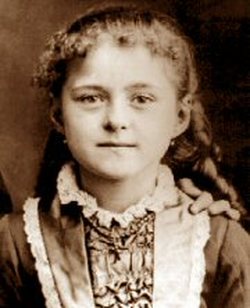 It was in October of 1942 that Van first met Thérèse, and when I say met, I mean, you know, really met her, like you might meet the person who will become your best friend, or your spouse, or your spiritual director—though usually when we have these first meetings, we don’t know as quickly as Van did just how significant the meeting is. It happened like this . . . One evening Van was in the chapel with all the other boys, but rather than simply praying or daydreaming, he was struggling with a deeply troubling thought. He was feeling a tremendous desire to become a saint, but he was fighting this feeling with all his strength because it seemed wrong to him, presumptuous, to dare aspire to sainthood. When I reflect on Van’s moral dilemma, I am newly appreciative of Vatican II’s emphasis on the universal call to holiness, as well as grateful again for St. Thérèse’s Little Way. We are so used to thinking, “Of course we’re supposed to become saints!” that we don’t realize what a blessing this knowledge is. Van was suffering interior torment because he thought his desire to become a saint was one huge temptation! He decided, wisely, to turn the whole problem over to the Blessed Mother. He told her to take care of it, and then he left the chapel for study hall. Once there, since he’d already done his homework, he had the privilege of choosing a saint’s book to read. He went to the shelf and browsed the titles. No luck—he’d read them all before, at least all the good ones. Sure there were some he hadn’t read, but they didn’t have pictures! Nonetheless, he figured he’d better choose one, so he told the Blessed Mother, “You choose for me and I’ll read what you pick,” and then shuffling the books and closing his eyes, he chose at random. Bad news—it was Story of a Soul by St. Thérèse of the Child Jesus. No pictures inside, and furthermore, he could predict what it would contain. “I know it already,” he told himself. “Same old story. You were born amidst miracles and prodigies, lived an austere life full of penance and many more miracles, then died in old age, having been perfect from start to finish.” He laughed to himself, but then realized he was not keeping his part of the bargain. He’d told the Blessed Mother he’d read the book she had him choose. So with an uninspired imagination, he opened the book and began reading. He was caught! It took no time at all for him to realize this was unlike any other saint book he’d read, and quite unlike what he’d predicted. Deeply involved in Thérèse’s words from the first page, Van found himself full of joy and his earlier dilemma (about becoming a saint) resolved. Here was a book that spoke to his fervent young soul. Here was a saint who wrote about just the kinds of things he felt. The book became his constant companion. This conjunction of boy and book was, however, merely a faint foreshadowing of the joy and friendship that was to come. Not long after his discovery of Story of a Soul, Marcel was with his two best friends one desultory afternoon during vacation. They were all staying over at the presbytery during the break, but some of the staff were gone, and this meant the task of mending their clothes was left in their own boyish hands. Marcel thought up a plan to get out of this hated task which took so much time from their play. “Why don’t we ask one of the young women who works over the break if she’ll be our big spiritual sister? We can promise her rosaries, and in return she can do our mending and laundry!” It sounded like an ideal plan, and Marcel dictated a letter which they then threw—with all their dirty and torn clothes—into the designated girl’s work area. Not so subtle, but definitely worthy of fourteen year old boys! Soon after, a note came back, attached to a rock that sailed through the window. “I see right through your ploy,” the young woman wrote, “but I find your childishness somewhat charming and I will be your big sister and darn your pants—except not Van’s! He’s too old and can do his own work.” Van’s friends thought this was hilarious and teased him to no end, but Van ignored them and continued with his reading (he’d finished the book and begun again) Story of a Soul. He was enjoying it tremendously, and especially loved Thérèse’s scenes from childhood. Though Van’s own childhood had not been easy, neither had Thérèse’s, with the death of her mother when Thérèse was only four. Still, they both had wonderful early memories of loving times with their devout parents, and Van was fascinated by all that Thérèse related. At this moment, he was reading again about how, after their mother’s death, Thérèse’s sister Celine turned to their eldest sister Marie and said, “Now, you will be my mother.” Thérèse would have liked to say the same to Marie, but thought of their next oldest sister, Pauline. Wouldn’t she feel left out if no one chose her? “Pauline, you will be my mother,” Thérèse said. Van just loved this—and suddenly it occurred to him. Why should he ask this young woman to be his big sister just because the other boys did? Wouldn’t Thérèse feel left out? He would ask St. Thérèse to be his big sister. Not that she’d darn his pants, but certainly she would be the best big spiritual sister anyone could ever have. He went to the chapel and knelt down to say his prayer. He asked Thérèse to be his big sister and accept him as her little brother. And then . . . he was filled with such a rush of joy that he couldn’t remain in the chapel! He darted out and ran all the way to the bottom of the mountain where he and his buddies loved to play. He was alone there now, and he could give full vent to his feelings. He sang every holy song and religious hymn he knew—in Vietnamese, in Thai, in French and Chinese! He cavorted and gamboled around the mountain base and among the rocks, singing at the top of his lungs to give some relief to this tremendous joy which flooded his soul. She had said yes! He knew St. Thérèse had said yes and would take him as her little brother—not that he had heard anything, but oh, the joy! It far surpassed any consolation he had ever felt, and he knew it meant yes. Exhausted and unable to sing another note, he happily collapsed, sitting on a rock, his arms behind him, his legs outstretched in complete openness. Every once in a while he’d manage another phrase from a song. The joy did not abate, but he began to think over the situation. Why was he so happy? And then he heard a voice. A woman’s voice, or a girl’s really. “Van, Van, my dear little brother!” he heard. The tone and the words were so intimate that he was at a loss who could be speaking. It couldn’t be anyone he knew; it couldn’t be the young woman who’d rejected him as her brother. But who then? Again he heard the gentle voice: “Van! My dear little brother!” There was only one possibility . . . Could it be? “Yes, Van, it is really your sister Saint Thérèse . . . I have come here to reply to your words which have echoed in my heart. Little brother! You will be personally and from now on my little brother, just as you have chosen me, personally to be your big sister. From now onwards our two souls will be separated no longer by any obstacle as they formerly were.” This was their first meeting, but not their last. Van tells us that his big sister spoke to him for a couple of hours, explaining many things about God’s Fatherhood and love for him, about her love for him, about the life of love God had planned for him. Three years later when Van had entered the Redemptorist Order to become a brother (St. Thérèse had eventually gently broken it to him that God desired him to be a religious brother, not a priest), his novice master and spiritual director, the French Canadian Redemptorist Father Anthony Boucher, asked him to write his life story. Van, now Marcel Van, wrote four entirely separate drafts, each several hundred pages long. In the final draft, now published as his Autobiography, Marcel takes several pages to recount Thérèse’s first conversation with him. He then says that each time he’s written an account of it (at least three other times in his previous drafts), it comes out differently. There was so much she said to him that he could never in one attempt remember it all. But, he says, this gives you the gist of it. Honest to Pete, the gist is not enough for me! I hope someday to have every account he wrote so that I can have as many words as possible and as many bits and pieces, fragments or paragraphs of this awesome conversation! She told him of God’s love for him, as well as her own love for him, and most importantly she encouraged Van to speak to God with utter simplicity. This came naturally to Van, for he was charmingly simple and remained so, but he had been taught that it was proper to speak to God in long, fancy prayers, and so he tended to repress his spontaneous and natural effusiveness. Once Thérèse explained that God loves to hear our little stories, our heartfelt feelings, our thoughts and experiences and ramblings, Van was free to reach a new level of intimacy with God, his Heavenly Father, and with Jesus, his true Love. After that first meeting with his big sister Thérèse, Van was blessed with many more heavenly conversations. And not only with Thérèse, but with Jesus and Mary as well. It was, as I mentioned, about three years later that Van was admitted to the Redemptorists as a novice. There in the novitiate, Jesus asked Van to be His little secretary and write down all that Jesus said to him. When he told his novice master, Fr. Boucher, about these conversations, the wise priest first approved, and then instructed him to cease writing down the conversations. Van instantly obeyed. After two weeks, Fr. Boucher lifted the restriction and Van continued writing Jesus’, Mary’s, and Thérèse’s words to him (as well as his own to them, as Jesus had instructed him to do) for about a year and a half. He confided the pages to Fr. Boucher, who carefully recopied them and who later, leaving the original in Vietnam, smuggled out the copies to Canada with a fellow Redemptorist priest. Marcel Van went through the novitiate and made his temporary vows on September 8, 1946 (when he was 18; St. Therese had made her vows on this date in 1890 when she was 17), and later his final vows in 1952 (at age 24). He had been born near Hanoi and lived until 1950 in the north of Vietnam, but obedience brought him to Redemptorist houses in Saigon and the south of Vietnam from 1950 to 1952. In 1954, at his request, his superiors allowed him to return to the Hanoi Monastery on what turned out to be the last plane from the South to the North. The communists had taken over North Vietnam and Marcel wanted to go there so that someone would love God amid the communists. It was only a matter of months before he was arrested on a lame charge and put into a prison camp, condemned to 15 years of re-education. At one point he left the camp to try to procure the Eucharist for fellow prisoners and was caught and put into the dungeon for long months. After three years in the camps, having served God and his fellow prisoners with great love and affection, Marcel Van died on July 10, 1959. He was 31 years old. Fr. Boucher, by God’s providence, lived to be much older. When he returned to Canada in 1964, he spent the next 20 years translating Marcel’s writings from Vietnamese into French. Fr. Boucher had such a mastery of both languages that his translations are considered perfect. In all, he collected, copied, translated, and preserved for us four volumes of Marcel’s writings: his Autobiography, Conversations, Correspondence, and Other Writings. Father Boucher knew Marcel better than anyone on this earth, having been his spiritual director from the time of Van’s entrance into the Redemptorists until Van’s death in 1959. Fr. Boucher himself died in July of 1991, aged 84, after having successfully introduced Marcel’s Cause of Beatification. Here is what the holy French Canadian Redemptorist missionary had to say about his spiritual son, the beloved little brother of St. Thérèse: “In my capacity as master of novices and spiritual counselor, I testify that I have lived, day by day, and at the side of Brother Marcel, all the events and little facts related on the small pages that he gave to me regularly each week. On reading these texts, I sensed that this very small brother whom Jesus, Mary and Thérèse were leading by the hand would have a role to play in the Church and in the world. I also felt myself constrained not to allow anything to be lost from the treasure which was unfolding before my eyes, by his hands and his heart. I humbly recognized that Brother Marcel taught me more on the spiritual life than I was able to teach him. “First of all, I have been profoundly moved by the unbelievable familiarity and tenderness of which Brother Marcel has been the object on the part of his heavenly interlocutors. On the other hand, his exemplary life, his limpidity of soul, his perfect obedience to his director and his generosity in face of sacrifice favorably impressed me regarding his truthfulness and the authenticity of his communications; this, obviously, with all the reserve necessary, nor wishing in anything to anticipate the final judgment which belongs by right to the authority of the Church.” 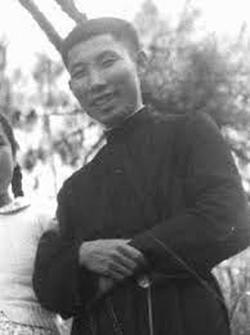 Here's Marcel smiling down on us. Rather disingenuous of him since, in fact, he's laughing right now. He thinks it's funny that I'm trying to make such a big deal out of him; that I've quoted his "bearded Jesus" to impress you and make you love him . . . If I could make the whole world love Marcel Van, I would. And it's quite a mystery to me how he remains so unknown (which is the only way he could remain unloved!) especially when he is truly a second St. Thérèse, his spiritual sister who prophesied before her death, "The whole world will love me!" There's a strange logic at work here . . . If the whole world loves her, and he is a second her, then how can the whole world not love him? Ah, mysteries. They make life interesting and give us something to write about! Well, it's my joy to write this now as the year of Our Lord 2017 is drawing to a close. Given the fascinating combination of longevity and ephemerality that characterizes a blog post (and the internet in genera)l, I hope this answer to "Who is Marcel Van?" will last until Jesus comes on the last day, that wonderful day when all that is hidden -- including our dear Marcel and his extraordinary message of littleness and Love -- will be made plain. Meanwhile, you are now one of the cognoscenti, clearly loved immensely by God, for He has introduced you to one of His very best friends, St. Thérèse's little brother Marcel Van.
Comments are closed.
|
Miss MarcelI've written books and articles and even a novel. Now it's time to try a blog! For more about me personally, go to the home page and you'll get the whole scoop! If you want to send me an email, feel free to click "Contact Me" below. To receive new posts, enter your email and click "Subscribe" below. More MarcelArchives
June 2024
Categories |

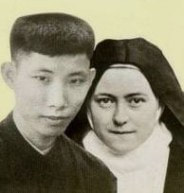
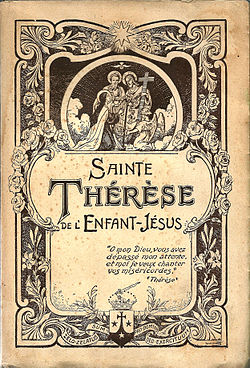
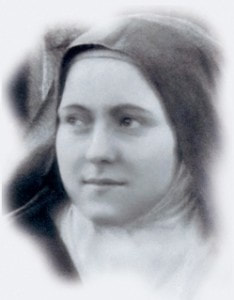
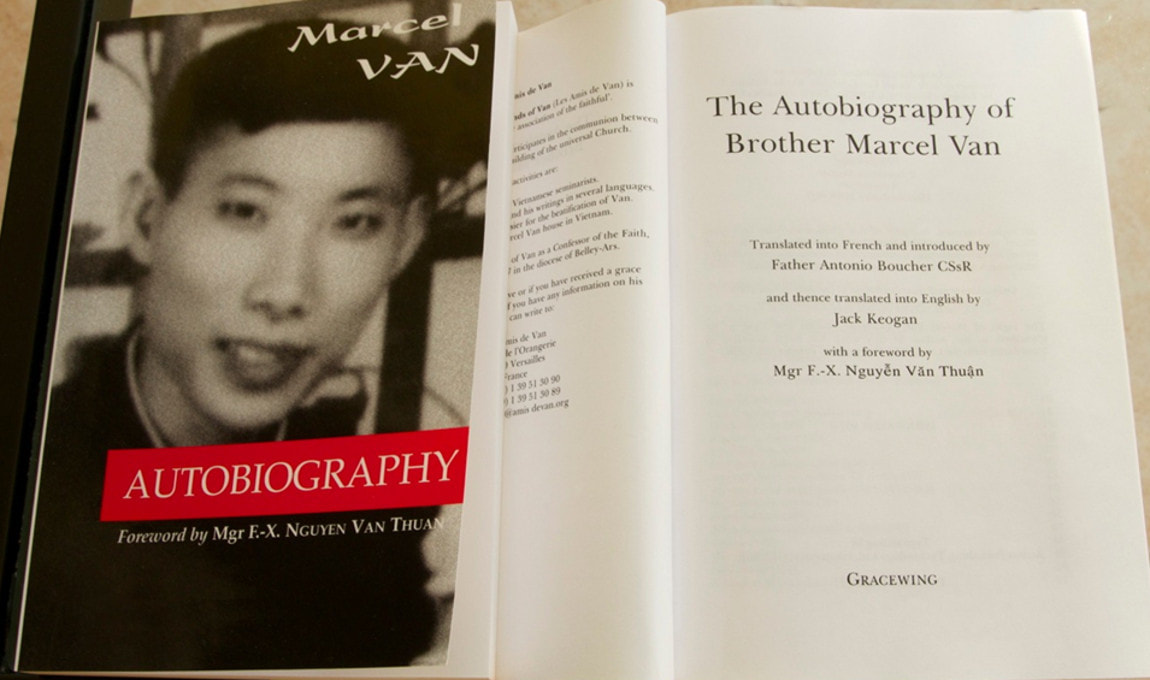

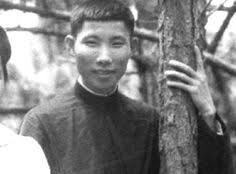
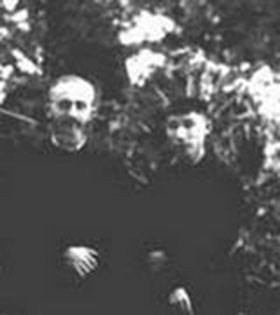
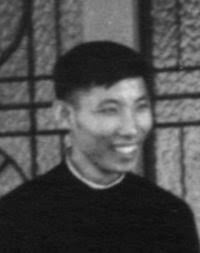
 RSS Feed
RSS Feed